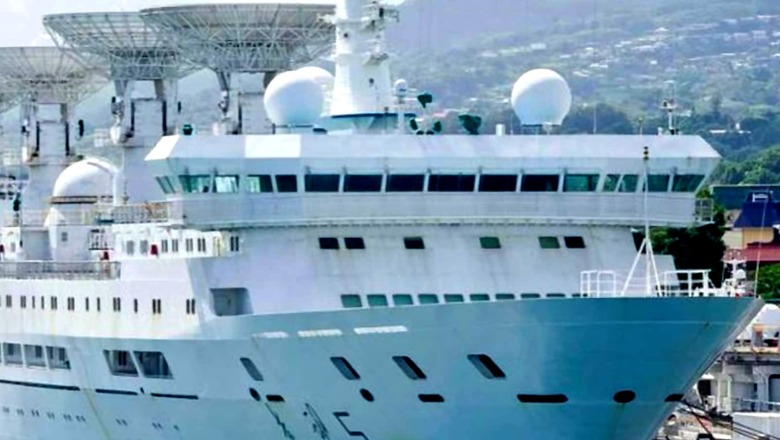
views
With an increasing economic strength, India is also trying to become a responsible power in the neighbourhood as evident in its $4 billion help to Sri Lanka during their unprecedented economic crisis this year. But now there is a resentment in India that we did a lot for Sri Lanka during their current economic crisis but it still allowed a Chinese spy ship, Yuan Wang 5, to dock at its Hambantota Port.
Yuan Wang 5 is a Chinese ship under the command of a special theatre-command level organisation created by the People’s Liberation Army for centralisation of strategic “cyber, electronic, information, communications, and psychological warfare missions and capabilities”. It is equipped to not only track satellites but also intercontinental ballistic missiles. This ship actually has the capacity to track India’s satellite operations and other critical information such as missile telemetry.
Reportedly, India and the US had expressed their concerns to Colombo over docking of a military ship in the Indian Ocean Region. This led to a “clarification” from the Chinese Foreign Ministry regarding “scientific research activities” of Yuan Wang 5 being consistent with international law.
Yuan Wang was supposed to dock five days earlier than it actually did, leading to speculations that Sri Lanka was under diplomatic pressure. New Delhi later denied that it had any role in the delay of the ship’s docking or that it pressured Sri Lanka at all. Meanwhile, there are reports that the ship docked at the Sri Lankan port only for replenishment and not for any research purpose. According to Sri Lankan sources, the delay took place due to discussions with China regarding a conditional stop-over that included no carrying out of research activities and switching off the ship’s automatic identification system. These conditions imposed by Sri Lanka mean that it actually honoured the recent $4 billion help that India extended to the island nation at a time when China didn’t shell out a single dollar for the Sri Lankans.
Still certain commentators are agitated in India over Sri Lanka not being able to completely deny the docking of Yuan Wang 5. But the question is how much capability does Sri Lanka really have to refuse China from letting the ship dock at the Hambantota Port? Answer is zilch. The Hambantota port for all practical purposes is under the control of the Chinese. Sri Lanka was forced to lease out its strategic asset to China in 2017 for 99 years after it failed to pay debts involved in the construction of the facility.
Second, Sri Lanka’s economy is in a mess and it is seeking help from the IMF. China here could have played its cards and spoiled Sri Lanka’s chances of the same. China is a principal creditor to Sri Lanka whose cooperation is required by the IMF in terms of restructuring the payment schedule and writing off some loans. China is one of the largest creditors whose consent is important. India is also a major creditor but there is a very low chance of India linking its consent with its concerns over the spy-ship.
This incident aside, the fears in New Delhi and Washington regarding Hambantota are legitimate. China’s increasing assertiveness is a cause of worry as it may conduct such activities even more frequently. Till now China has carefully cultivated a narrative that Hambantota is a commercial port meant for the “benefit” of the Sri Lankans. A report in Global Times, CCP’s mouthpiece on the docking of Yuan Wang stressed on the same recently. Hambantota is strategically located near the main shipping route between Asia and Europe. In any event of conflict, it can prove to be of a huge strategic value to the Chinese. It is this same fact that sparks fear in India and the US that Hambantota may be developed as a military base.
In 2021, a report by the Pentagon identified Sri Lanka among a slew of countries where China may possibly set up a military base or a logistics facility. Sri Lanka is in a precarious situation with its dependence on both India and China for sustenance. The only option for India is to build its own capability to deter China and deepen its role in Sri Lanka.
The author is a PhD in International Relations from the Department of International Relations, South Asian University. Her research focuses on the political economy of South Asia and regional integration. The views expressed in this article are those of the author and do not represent the stand of this publication.
Read the Latest News and Breaking News here


















Comments
0 comment